African Homemade Marula Beer

‘Vukanyi” is the sweet sounding Vatsonga name for Marula beer.
It has a special ring to it for Anna Bila from Kaross.
The Marula tree (Scelerocarya birrea) is one of Africa’s botanical treasures, and its nutritional “gifts” have been used for thousands of years. It is indigenous to our area, the Mopani district of the Limpopo Province; and thus, part of our everyday African lives.
The benefits of the Marula fruit has been used by the local communities for centuries. The Marula trees’ fruit is filled with nutrients such as Vitamin C, Calsium, Potassium and Magnesium and are used for many medicinal purposes.
According to the Herbal Healer on www.nwitimes.com, the medicine made from the fruit, “banishes diarrhea, dysentery, rheumatism and the ill effects of insect bites is wrought from its astringent bark. The leaves are brought into the service of healing spider bites, burns and abscesses… The Virgin marula oil extracted from the kernels is rich in antioxidants and oleic acid.”.
Apart from all the many health benefits from the Marula, there lies a recreational treat as well- that has become part of economic activities for many people in the Limpopo province.
The fruit ripens between January and March every year- and this is the time one will find many a local party “juiced” up with some “Vukanyi” or Marula Beer.Like many other, Anna Bila- employee at Kaross- makes Marula Beer from the Fruit she collects on her way to work everyday. She then produces this alcoholic beverage called “Vukanyi” that she sells to her direct community. This forms part of an additional income for her.
We spent a few hours with her, Documenting the age-old process that she was taught by her elders.
Step one is to collect fallen Marula Fruits.
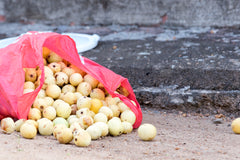

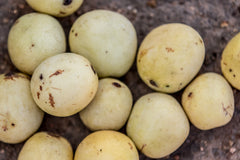
Step number two is to find at least 3 containers to work with, and peeling the Marula fruits. An extra pair of hands can also be helpful, just like Anna’s neighbor that stepped in and helped to peel the many many marula’s.
Container one is filled with water and the raw marula’s. Container two holds the peeled Marula’s and container three their peels. Keeping it neat and clean is definitely in Anna’s culture.
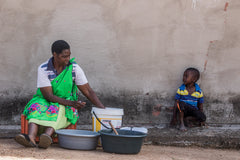
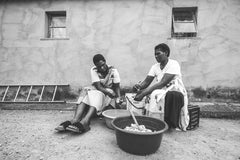

After this somewhat tedious step 2, step 3 is started. Here the peeled marula’s are moved to a different container and the juice is kept safe for a later step. And so the smashing begins. A rather odd looking stick with four loops at the end is used to smash the juices out of the fruit and separate the meat from the stone. It takes some effort.
All through out this step Anna uses her hands as well, after smashing she takes up the Marula’s and squeezes. It really makes a difference to use your hands and when things get sticky she adds a little bit of water.


Here Anna’s knowledge and years of experience comes into play. Up until this point I thought I would be able to do this, but now at step 4, she fetches water and pours in just enough to make the juice look like soup instead of paste. Her expertise made her slow down as she pour in just the right amount of water.


Step 5 is almost like step 3 – more smashing and more squeezing but the meat has started coming away from the stone and when she sees that it’s time, she takes a heap in her hands and give a final squeeze to release all the juices and then discards the left over stones into an empty container.

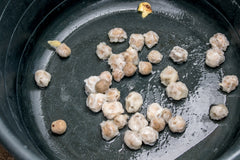
Step 6 brings the original juices back into play. This is the first fruit so to speak, which was kept aside. This is thrown into the bucket and with the lid on the mixture is left to ferment for a few hours.
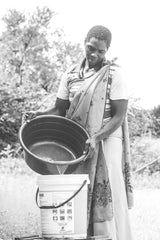



Step 7 sees the clear juice at the bottom of the bucket as the rest floated to the top. The top layer, or foam is scooped off and is not used. By this step you are able to drink the juice after it’s sieved into a jug, but it’s only fruit juice. After 2 days the fermentation will be finished and it is now turned into alcohol.
Her final step, step 8 is what makes her a small business owner, selling her produce:
Kaross’ very own Anna Bila’s Marula Beer.
The rainy season is over, we are at the end of the summers’ heat, the end of the Malaria Season and going into autumn. The winter is upon us. Let us Celebrate with the taste of a little bit of Vukanyi.
Acknowledgement to Kobie van Jaarsveld from Burstforth for spending the day with Anna Bila and documenting the process.





